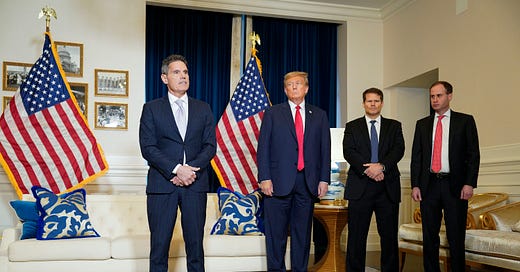Appeals Court Decisively Smacks Down Trump’s Immunity Claim for Jan. 6th
Plus: What to expect from the Supreme Court.

ON TUESDAY, THE U.S. COURT OF APPEALS for the D.C. Circuit issued a decision affirming the lower court’s denial of former President Donald Trump’s motion to dismiss the January 6th indictment against him on grounds of absolute immunity. Trump argued that, because he was still president on January 6, 2021, anything he did while president—even if it amounted to a crime—is beyond the reach of the rule of law. The decision was unanimous and “per curiam,” meaning no single judge on the three-judge panel is identified as the primary author. Trump will undoubtedly appeal to the U.S. Supreme Court, a move that could continue to delay the trial date, which was originally set for March 4 but remains on hold pending resolution of the immunity issue.
Meanwhile, the U.S. Supreme Court will hear oral argument this Thursday on whether states can exclude Trump from the ballot for having engaged in insurrection—the case emerging out of Colorado. The justices should read with great care the D.C. Circuit’s decision denying Trump blanket immunity. It offers a blueprint of logic and law for why they should rule that Trump engaged in insurrection under Section 3 of the Fourteenth Amendment, as well.
For purposes of presidential immunity in civil proceedings, the existing legal test concerns whether the actions Trump took as president fell within “the ‘outer perimeter’ of his official responsibility.” The underlying case here, however, involves criminal charges, and there is no established legal test for presidential immunity in criminal cases. Before Trump, no former president had ever been charged with a crime, so no criminal immunity claim had ever reached a court. (The closest analogy is President Richard Nixon’s role in the Watergate scandal, but President Gerald Ford pardoned him before any charges were brought.) In the prosecution brought by Special Counsel Jack Smith, Trump wanted the D.C. Circuit to, as the judges explained, “extend the framework for Presidential civil immunity to criminal cases”—applying the “outer perimeter” test to criminal acts, thereby giving the president very broad immunity for misconduct in office. The court rejected Trump’s argument, stating that although some presidential actions are purely discretionary—such as whom to nominate for a cabinet post, for example—a slew of other presidential decisions are “bound by law, including by federal criminal statutes.” As a consequence, presidents do not have “unbounded authority to commit crimes that would neutralize the most fundamental check on executive power—the recognition and implementation of election results.”
In addition to drawing a red line under the law, the court weighed in on the facts: “Here, former president Trump’s actions allegedly violated generally applicable criminal laws, meaning those acts were not properly within the scope of his lawful discretion.” The court listed five things that, according to the indictment, Trump did on or before January 6th:
He “‘used knowingly false claims of election fraud’ to attempt to persuade state legislators and election officials to change each state’s electoral votes in former President Trump’s favor”;
he “organized fraudulent slates of electors in seven targeted states” and had them transmitted to then-Vice President Mike Pence for use at the January 6th certification proceeding;
he pressed Justice Department officials “to conduct sham election crime investigations”;
he tried to convince Pence “to fraudulently alter the election results,” including through his rally near the Capitol urging supporters to pressure Pence; and
after thousands of supporters swarmed the Capitol, causing “violence and chaos,” Trump “exploited the disruption by redoubling efforts to levy false claims of election fraud and convince Members of Congress to further delay the certification.”
If Trump did these things, the court concluded, he can’t hide behind the presidency to dodge accountability: “Trump lacked any lawful discretionary authority to defy federal criminal law and he is answerable in court for his conduct.” The common-sense notion that presidents lack the constitutional power to commit crimes with impunity, and that what Trump did not only defies the spirit of our system of laws, but also sought—through actions backed up by violence—to undermine our national government, puts the D.C. Circuit ruling directly within the purview of Section 3 of the Fourteenth Amendment. That post-Civil War provision bans officers who took an oath to defend the Constitution from holding office again if they engaged in insurrection.
WHICH BRINGS US TO THE CASE that will be before the Supreme Court this Thursday. The Court agreed to review the Colorado Supreme Court’s ruling under Colorado law that Trump is disqualified from that state’s ballot for having engaged in insurrection on January 6th. Although there are a number of technical arguments the conservative majority could seize upon in order to give Trump a “win” in that case (such as finding that presidents aren’t “officers,” that January 6th wasn’t an “insurrection,” or that Trump didn’t “engage” in it), the Court instead should borrow the D.C. Circuit’s reasoning and apply it with equal force to Section 3.
Presidents have a constitutional “interest in upholding Presidential elections and vesting power in a new President under the Constitution,” the D.C. Circuit reasoned, and voters have an “interest in democratically selecting their President.” Trump’s actions “were undertaken . . . in furtherance of a conspiracy to unlawfully overstay his term as President and to displace his duly elected successor.” As such, they “violated the constitutionally established design for determining the results of the Presidential election.” In other words, January 6th was an insurrection and Trump engaged in it.
As for the argument that presidents aren’t officers bound by Section 3, the D.C. Circuit did not address that question directly but said something relevant to its consideration: Presidents—unlike anyone else in American government—have a “constitutional mandate to enforce the laws governing the process of electing the new President.” They should be more—not less—accountable for engaging in insurrections than subordinate officers within their chain of command. Quoting Justice Robert Jackson’s concurring opinion in a landmark case from 1952 involving presidential power, Youngstown Sheet & Tube v. Sawyer, the D.C. Circuit observed:
Executive power has the advantage of concentration in a single head in whose choice the whole Nation has a part, making him the focus of public hopes and expectations. In drama, magnitude and finality his decisions so far overshadow any others that almost alone he fills the public eye and ear. No other personality in public life can begin to compete with him in access to the public mind through modern methods of communications. By his prestige as head of state and his influence upon public opinion he exerts a leverage upon those who are supposed to check and balance his power which often cancels their effectiveness.
What might the Supreme Court do next in the immunity case, assuming that Trump files a request by the February 12 deadline to extend the trial court’s stay pending an appeal? In theory, the Supreme Court could take the case but schedule it for its next term, which begins in the fall. That move would delay the trial past the November election. It seems much more probable, though, that the Court will either deny Trump’s request for an appeal—which means that the delayed trial would presumably begin fairly soon—or grant certiorari and hear the case this term, delivering an opinion before recessing in June. That would allow U.S. District Judge Tanya Chutkan to move forward with the trial starting this summer or in the early fall, with a jury verdict likely before the election.
Let’s hope that, in considering the case, the justices exercise the same order of reason that the D.C. Circuit judges demonstrated in rejecting Trump’s absurd immunity claim. They summed it up perfectly: “Former President Trump’s alleged efforts to remain in power despite losing the 2020 election were . . . an unprecedented assault on the structure of our government.”





